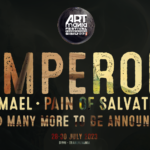The best traditional Japanese drum percussioner will be coming to Romania to play in a series of concerts alongside the “George Enescu” Philharmonic Orchestra, conducted by Horia Andreescu: 20th October, 19:00, Palace Hall Bucharest and 24th October, 19:00, Thalia Hall, Sibiu.
Event supported by the Japanese Embassy in Romania, Tokyo Metropolitan Government, Japan Foundation, Sibiu Local Council through Sibiu City Hall, Sibiu District Council in partnership with Sibiu International Theatre Festival. Logistic partners: TNT Romania, Paradigma Group.
Ticket prices range from 50 to 180 ron for the concert at Palace Hall and 75 to 105 ron for the concert at Thalia Hall. Tickets are available in stores: Diverta, Germanos, Orange, Vodafone, Domo, Humanitas book stores and online on www.eventim.ro and www.myticket.ro
The concerts will start with a series of works signed by local composers: Bela Bartok, George Enescu, Ciprian Porumbescu, Doru Popovici, Tiberiu Olah and Grigoras Dinicu
The second part of the concert will feature the Hi-Ten-Yu – A Concerto for Japanese drum and orchestra, composed by Isao Matshushita.
The main instrument, the Wa-daiko Japanese Drum, weighting about 1322 pounds will be brought from Japan by special delivery.
The wa-daiko, a traditional Japanese percussion instrument common to the special ceremonies of Japanese festivals, often imitates the unification of heaven and earth. The powerful sound of this festival drum travels all the way to heaven, quickly transforming to free and delicate sound, and resonates back as a deep howl from the earth’s abyss. The title of this composition, comprised of three Chinese characters Hi-Ten-Yu (Fly – Heaven – Play), symbolically suggests “flying to heaven to play among the stars.” Like the title, this composition is divided into three parts.
The entire piece centers around free movements of a wa-daiko and develops from tranquility to vigorous activity. While the wa-daiko’s keen and instinctive power represents one world, another world consists of demands on the orchestra to logically construct the piece. In all parts of this composition, I attempted to unify these two worlds. Isao Matshushita
The Hi-Ten-Yu concert’s soloist, Eitetsu Hayashi, is a living legend with a star status in Japan, being the artist who revolutionized the manner of interpreting Taiko. As part of the Shinto and Buddhist ceremonies, Taiko has become a specific style of percussion, renowned for uplifting auditions.
Eitetsu is a pioneer thanks to his work with the complicated and hypnotizing Odaiko to film scores and orchestra collaborations.
Eitetsu Hayashi, a Hiroshima native, born in 1952, was raised in a Buddhist temple, listening to his father’s sustras daily. By the age of 19 he was playing the drums a Western style band, and in 1972 he founded the legendary taiko group- Sado Ondekoza, or the The Demon Drummers of Japan, renowned for their daily 60 km trip and rehearsals done in near-freezing temperatures.
The George Enescu Philarmonic is an iconic Romanian musical institution. Founded in the year 1869, The Romanian Philharmonic Society, conducted by Eduard Wachman, aimed to organize a permanent symphonic orchestra, to spread musical culture and make popular the masterpieces of classical music. Under its conductor, the Philharmonic Society held its first concert in December the same year. Once the Romanian Athenaeum was inaugurated on March 5th 1889, concerts began taking place in this hall, as how it happens today, the Romanian Athenaeum turning into a symbol of Romanian Culture and the headquarters of the Philharmonic. Wachman, the first conductor until 1907 was followed by Dimitrie Dinicu (1868-1936) and since 1920 by George Georgescu(1887-1964), student of Arthur Nikisch and Richard Strauss. During his time, the repertoire was brought up to date, and the Philharmonic entered the international musical circuit by taking part in its first outbound tours, as well as by inviting personalities of the interwar musical world: Jacques Thibaud, Pablo Casaldo, Igor Stravinski, Enrico Mainardi, Alfred Cortot, Maurice Ravel, Richard Strauss, Iehudi Menuhin, Herbert von Karajan.
After the war the institution diversified its activity: the Academic Quire is founded, as well as a valuable body of solo interpreters (instrument players and singers), different chamber music ensembles (from orchestra to piano trios). Since the death of George Enescu in 1955, the Philharmonic has takes his name. Constantin Silveştri, Mircea Basarab, Dumitru Capoianu, Ion Voicu, Mihai Brediceanu also lead this institution. After the fall of the communist regime, the George Enescu Philharmonic regained its old status due to the leading of the general manager Cristian Mandeal and the artistic manager Nicolae Licaret. During the conducting of Cristian Mandeal (1991-2010) the Philharmonic Orchestra recorded the entire works of George Enescu and Johannes Brahms. The philharmonic has recorded tens of LP and CD records, taken successful tours in Europe, Asia and Far East, besides the symphonic and chamber concerts (almost 300 a year), thus gaining a world renowned reputation.
Born in Brasov, Romania, Horia Andreescu graduated from the National Music University of Bucharest, conducting class, he then attended master classes at Vienna (with Swarowsky and Östereicher), at Trier and Munich (with Celibidache), making his debut in 1967.
From 1976 to 1987 he was Principal Conductor of the Philharmonic Orchestra of Ploiesti, from 1987 he conducted the Bucharest Philharmonic Orchestra (where he was appointed Assistant Director from 1987 to 1990), and currently is Chief Conductor of the Romanian Radio Orchestra.
He founded “The Virtuosi of Bucharest”, an ensemble he has led in concert and tour performances. For over 12 years he was Principal Guest Conductor of Berliner Rundfunk Orchester, Schwerin Staatskapelle and Dresden Staatskapelle, having also conducting engagements with Berlin Staatskapelle, the Symphony Orchestras of Berlin, Vienna, Jerusalem, with Gewandhaus-Leipzig, the BBC Scotland, the Radio Orchestras in Madrid, Lisbon, Leipzig, Hamburg, Copenhagen, Reykjavik, the philharmonic, symphonic and chamber music orchestras in the Netherlands, Collegium Musicum – Copenhagen, the Israel Chamber Orchestra, the Philharmonics of London and Budapest, also with famous soloists such as Anne Sophie Mutter, Maxim Vengherov, Misha Maisky, Viktor Tretiakov, Elisabeta Leonskaia, Uto Ughi, Zoltan Kocsis etc.
He has been often invited at numerous festivals, “Wien Modern”, “Wienerfestwochen”, “Europa Musicale” – Munich, the Berlin Contemporary Music Biennial Festival, “George Enescu” – Bucharest, the festivals in Dresden, Copenhagen, Santander, Istanbul, among others. His rich discography includes numerous recordings with the Radio Orchestras of Bucharest, Berlin, Cologne, the BBC Scotland, Madrid, Suisse Romande, and record releases (over 50) on Marco Polo/Naxos, Bayer Record, Aksak-France, Attacca-Holland, Q Disc – Holland, Olympia – London, Erki Tonlist – Iceland, ” Kultur und Media “, Electrecord. In 2004, Hastedt – Germany edited a new CD with works by Pascal Bentoiu performed together with the WDR Koln Orchestra, followed by another CD together with the Radio Berlin Symphonic Orchestra for cpo, summing up over 500 minutes of recorded music in the capital of Germany alone.
In 2005 RCA-Red Seal released a CD with contemporary music (with the Berlin Radio Orchestra ). He is also a professor at the National Music University in Bucharest. He has won numerous awards, such as The Critique Award at the Biennial in Berlin – 1981, The Cultural Merit – Knight, UNESCO 2003 Award.





